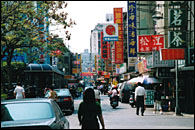The path to learning in Asia
Some students will spend their summer jockeying coffee or researching Chaucer, others will swat lakeside bugs and relax. Education Master's student Leanne Johnny asked to go to the western provinces of China.
 China's Great Wall
China's Great WallPHOTO: Paul Clark |
|
Paul Clark, executive director of the Faculty of Education's International Office, is rounding up roughly 50 interns and sending them to China and Taiwan to teach English to high school students for a month or two. Nine lecturers will also go to give workshops to local teachers.
Johnny, also president of the education graduate students' society, says, "I was looking to do development work in the summer, and this was a great opportunity."
"Working with China's quite complicated," Clark says. It took 6 months to set up this program and he is installing an office in Beijing. He says that many people in Asia see education (Western education in particular) as a path to international success.
"China, with its entry into the World Trade Organization, wants to bring students into the international realm. They'd love them to come to McGill, or another Western university.
"But their English skills stop them. They just don't have the proficiency to get in, especially at the undergraduate level." The schools are eager for interns to help.
"The central city schools are really well funded. They have access to government funding to pay for [the interns]," Clark says. The schools out in the countryside are more isolated -- "our ultimate goal is to spread out to where the need is greatest, the western provinces."
Interns give up their Saturdays to do an eight-week intensive training session. They're given a lively crash course on methodology, classroom management and curriculum. They talk about how to implement what they learn, and what they want to achieve. As well, they're taught about cultural differences and some very basic Mandarin.
 Taipei, Taiwan
Taipei, TaiwanPHOTO: Paul Clark |
|
Johnny's delighted with the training about the culture and on teaching English as a second language. "It's been excellent, very helpful, and has got us excited."
Aside from the language difference, Johnny imagines the job itself will be the greatest hurdle. "I think teaching in China will be completely different from teaching high school here. There, teachers are very respected, the students are quiet. It'll be a challenge to get them to speak. You want students to talk to each other in ESL." The teachers at the training session recommend interns "give them a bit of a cultural exchange while respecting values."
The fundamental differences between Asian and North American cultures will take some adjustment, Clark says, "China is so complex. It's hard to think of China as one unit -- it's so big," he adds. "Taiwan is closer to what I grew up with [in Canada]. There's freedom and free enterprise. It has that intimate, human feeling -- everything's crushed and crowded."
Clark says that collectivism is admired more than individualism in China. "They don't understand people wanting to go off alone, or to just talk among two." And discussing or joking about politics is still a touchy matter, Clark notes. "Let's say the government does not yet welcome criticism."
The speed and ambition of development in China is impressive, Clark says. Every school displays on their front wall a ten-year plan for what they want to accomplish. "It's refreshing to see a society that's so ambitious, just in terms of education."
But China's eagerness for western education could prove to be double edged. Clark notes that in such situations, "you get something, but sometimes you lose something too." He hopes to instill in the interns a sensitivity to local cultural issues, "helping them achieve what they want without imposing our values." He cautions interns to not be judgmental when inevitably faced with situations that may not sit well with their Western customs.
Clark looked for interns who are enthusiastic and flexible. "We give them a scenario: You have no materials, it's the first day, and the students speak no English. What do you do?" he asked. "A lot of good teaching is thinking on your feet," he says, "what to do when the unexpected arises."
Roughly half the interns will go to China, and the rest to Taiwan. There will be no fewer than three teachers in any school, so the interns can teach together, feel secure, and have someone to turn to. Overall, Clark says, "we want them to do good work, and experience the culture.
"The number one priority is to protect the teachers, make sure they have a good time. The second is to make sure the Chinese and Taiwanese governments and students are happy with the job we did for them. And, thirdly, we want to maintain the quality and reputation of McGill. This is why we're doing such a great length of training."

